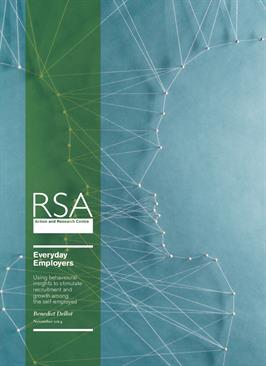Self-employment is growing rapidly in the UK, yet experience tells us that few of these new businesses are likely to grow and create jobs for others.
The number of self-employed people has grown by 30 percent since 2000, with the result that 1 in 7 of the workforce now answer to themselves. However, the vast majority of these new business owners have yet to recruit workers. Only 3 per cent of non-employers took on staff (and kept them) over the 5 year period from 2007-2012. This is concerning not least because our economy has historically relied on small businesses to create jobs, particularly for those on the margins of society such as migrants, the recently unemployed and those with few qualifications.
The government has sought to respond to this challenge by introducing a number of measures, most of which have centred on breaking down the barriers to finance, deregulating the labour market or providing extra information. While it is too early to determine the impact of some of these interventions, we know that a number have fallen well short of their intended targets. The recent National Insurance contribution holiday, for example, had a very low take-up rate, with just 6 percent of the expected number of businesses benefiting from the tax break.
The disappointing experience of using conventional policy levers to boost employee recruitment indicates the need for a fresh approach. In this report we argue for the application of behavioural insights to deepen our understanding of the challenge. This means exploring the impact of negative mindsets and misperceptions on growth intentions, as well as the effect of cognitive biases on people’s willingness to take on employees. The essential message is that business owners should be treated as humans – with all the quirks and frailties that entails – rather than as calculating and hyper-rational individuals. Only by doing so can we hope to devise effective interventions that have a significant impact in stimulating employee recruitment and growth.
The report sets out a number of recommendations, including to:
-
Establish host employers – Housing associations, FE colleges and other local institutions should be encouraged to legally ‘host’ employees on behalf of business owners, and help them to manage back-end HR tasks.
-
Conduct more RCT evaluations of business support – Government departments should carry out more randomised control trials (RCTs) of major business support interventions, possibly made obligatory for any scheme over a given cost threshold.
-
Appoint information curators – Government departments (e.g. BIS, DWP and HMRC) should appoint information curators who could improve the framing of messages directed at business owners.
-
Introduce a business adviser role for accountants – Accountants should be encouraged to support their business clients with information and advice about growing their business, possibly enabled through a new business coaching module in their accountancy training.
-
Embed ‘story-editing’ techniques within business support – Business support practitioners should use new story-editing techniques to help business owners reinterpret their personal narratives and improve their self-efficacy.
-
Introduce an automatic opt-in for wage subsidies – As part of any new wage subsidy scheme, the government should automatically allocate business owners a pot of subsidies, which they would ‘lose’ were they not to use it.
pdf 3.1 MB
Contributors


Be the first to write a comment
Comments
Please login to post a comment or reply
Don't have an account? Click here to register.